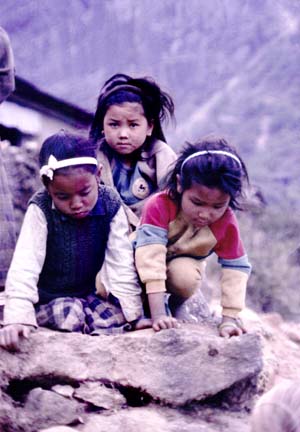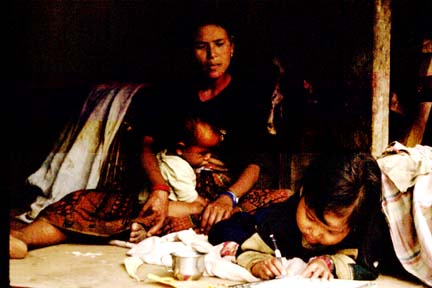Ethnographic Research Project
This major assignment for the class is to go out into "the
world" and do ethnographic study to explore a social or cultural
issue of particular interest to you. It is not a library project,
though in some cases a little library research or outside reading
may be appropriate. You will need to think about three major areas
as you develop your project idea and engage in ethnography: (1)
a site/topic; (2) a research question: an issue or problem that
focuses your discussion of the site/topic; and (3) a well-thought
out set of methods, or ways to investigate the issues that interest
you in context of the particular site you have chosen. These three
areas are related: an issue that may be very fruitful in one site
may leave you with little to work with in another site. A method,
or way of approaching your issue that works well in one context–or
to illuminate one theoretical issue–may be completely inappropriate
or non-illuminating in another case.
If you choose something familiar to you, an organization you belong
to, for example, try to look at it as if it were strange. Step back.
Imagine that you don't know what's going on. Ask some new questions
of the situation. If you choose something unfamiliar, try
to figure out how it makes sense, what is the logic guiding it,
what are the assumptions that you have to understand in order to
understand what is going on. Your project could be an analysis of
a ceremony, a social gathering, a place where people come together
for one purpose only, like a bus station or a beauty parlor. You
could look at a group that you are a member of--a club, a performing
group, a religious organization. Or you could choose a topic with
which you are not already connected. Start looking around at places
where people congregate or thinking about groups that you are already
a part of.
Methods:
You will want to choose your research methods to best fit your
topic and the kind of research questions you are investigating.
You will probably use some combination of participation, observation,
and interviews. If you want to be innovative with other methods,
please discuss it with me. Whatever your method, you will need to
take notes; you may take notes while observing in your research
situation, or, if this is impractical, you may write down notes
afterwards. But do keep a written record of your observations
as you go. First impressions can be very different from later impressions
and you do not want your original impressions to be lost. YOU WILL
NEED TO TURN IN YOUR NOTES (see syllabus for date). These will be your
actual
notes in progress; you are not required to type these notes up or
put them in any special format. They should be a combination of
field observations and your initial assessments or organization
of those topics. You should include a cover sheet with your notes
that gives a brief progress report of the research to date, any changes
made to your topic since your original proposal, and so forth.
Writing Up:
The paper (10 pages) needs to be clearly organized and should include
the following (these need not necessarily be separate sections,
nor do they have to appear in the order presented below):
1) A precise statement of the issue(s) the project addresses;
2) A description of the ethnographic site, group, context,
event, or situation;
3) A discussion of the methods you used, what you actually
did in your fieldwork, and how
effective those methods were.
Did your ideas about your project topic change in the process
of doing ethnographic fieldwork?
4) An account of your observations, what you found out,
your results;
5) An analysis or interpretation of your results--what
does it all mean? How do your results illuminate the question
or issue you started out with?
When I am evaluating your project, I will look
for a strong argument, clearly stated and well supported; a clear
focus that guides the entire paper; effective use of ethnographic
material (descriptions, interview excerpts, etc.) to "thickly"
support and enrich–and even problematize–your argument;
and compelling analysis of your ethnographic material. I also expect
the paper to contain some reflections on your process, on
how you did the ethnographic work; how you made decisions about
what you did ethnographically; what worked and what didn’t
(and why); who you talked to and who you didn’t talk to (and
why); how the methods you chose might have affected your findings;
and why you think your methods were appropriate both to your research
question and to your research setting. In the case of interviews,
be sure to describe your respondents in whatever way is relevant
to your project (ethnicity, gender, class, age, etc). Finally, I
expect thorough and effective consideration of relevant course themes
and materials to be integrated into the paper (if there are no relevant
themes and materials, you have not chosen a project appropriate
for this course). All references should use Anthropology style (a
style guide is available in the Anthropology office).
BE SURE TO TURN IN ALL OF YOUR PROPOSALS, NOTES, ETC. WITH YOUR
FINAL PAPER. INCLUDE A TITLE PAGE AND BIBLIOGRAPHY IF YOU USE ANY
SOURCES OTHER THAN YOUR OWN OBSERVATIONS.
I encourage all of you to go to the Writing Center for help in
organizing and writing your paper. You don't have to have the whole
paper drafted before you go in; at the Writing Center, they can
help you organize your material prior to writing. They can also
help you work with drafts of your paper. It is helpful to them if
you can bring in this assignment description so they understand
the expectations for the project.
|



